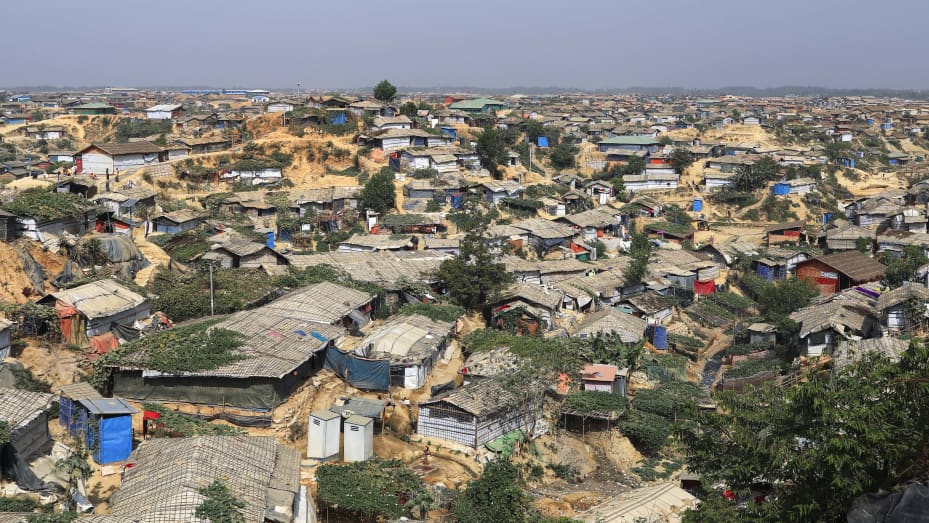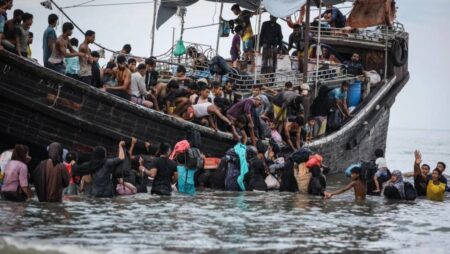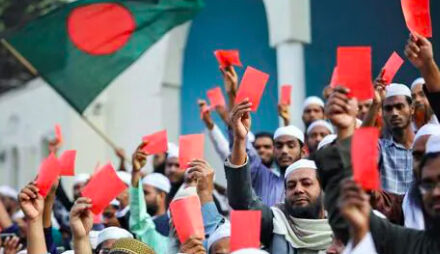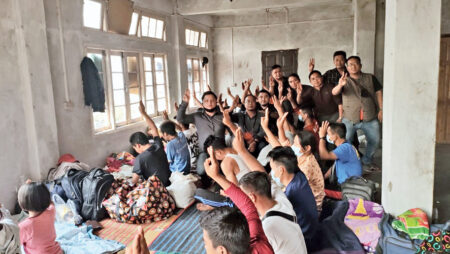MANTRAYA ANALYSIS#57: 22 JANUARY 2022
Rohingya Refugee Camps in Bangladesh: Sweep of Radicalization
Bibhu Prasad Routray
Abstract
For nearly one million Rohingya refugees in Bangladesh, the long wait for repatriation to Myanmar continues to grow longer. While Bangladesh is in no mood to grant them the right to freedom of movement beyond their camps, the unrest in Myanmar virtually rules out the possibility of their return to their homes in the Rakhine state. The impact of protracted lack of access to livelihood avenues and education can be catastrophic for this huge mass of population, which includes about 400,000 children. A steady uptick in the incidents of organized crime, radicalization, and other forms of violence are signs of the dangers that can affect Bangladesh and Myanmar in particular and South and Southeast Asia in general in 2022 if a solution to the crisis is not found.

Introduction
Nearly 745,000 Rohingya were driven out of Myanmar into the overcrowded camps in neighbouring Bangladesh in 2016 and 2017. Over the years, hopes of their repatriation back to their home country have continued to fizzle out. Four years and counting in the congested refugee camps sans basic facilities, right to work and pursue education, and freedom of movement, the refugees have primarily depended on the weekly and monthly subsistence assistance from various aid agencies. Over the years, the search for safety that drove the Rohingya to Bangladesh has gradually turned into desperation, which is now being exploited by criminal and organized crime groups, and also, by the terror outfit, the Arakan Rohingya Salvation Army (ARSA).
Killings in Refugee Camps
On 29 September 2021, 48-year old Mohibullah, chief of the Arakan Rohingya Society for Peace and Human Rights (ARSPH), was shot and killed by unidentified gunmen in Kutupalong camp in Cox’s Bazar, Bangladesh. An influential Rohingya leader, he had been documenting the Myanmar military’s crimes against the Rohingya and advocating for the refugees’ rights in international forums. The ARSPH has been advocating a moderate line of negotiation with the Tatmadaw (Myanmarese military). He had faced death threats in recent years for his work. Bangladesh police have arrested eleven persons for the murder, who reportedly have confessed to their role.[1]
Mohibullah’s assassination was followed by the killing of seven other Rohingya refugees. On 22 October, unidentified gunmen entered the Darul Ulum Nadwatul Ulama al Islamia madrassa at the Balukhali refugee complex in Cox’s Bazar and randomly shot some victims and stabbed others with knives. Several others were wounded. One gunman, whom the Bangladesh police described as a ‘Rohingya miscreant’ was arrested with a gun, six rounds of ammunition, and a knife.[2]
An Arrest
Fast forward to January 2022. In the early hours of 16 January, Bangladesh Armed Police Battalion (APBn) arrested Mohammad Sha Ali from the Noukar Maath area at Rohingya camp-6 in Cox’s Bazar’s Ukhiya. Sha Ali is the half-brother of ARSA commander Ataullah Abu Amar Jununi. A weapon and an unspecified quantity of narcotics were recovered from him. A Rohingya civilian whom Sha Ali had abducted was rescued. Preliminary investigations have revealed that Sha Ali holds a Bangladeshi national identity card that mentions his permanent address in Chattogram (Chittagong) city.[3] On 18 January, the ARSA clarified that Sha Ali, a former ‘low-key’ member of the group, had been relieved of duties two & a half years ago after being diagnosed with heart disease and suspected of cancer.[4]
Surge in ARSA’s activities
Sha Ali’s arrest comes at a time when the ARSA is reportedly gaining ground in Myanmar. The group has been blamed for a spate of violence in Myanmar that led to the killings of security force personnel in 2016, and which ultimately provided the Tatmadaw to start the ethnic cleansing of the Rohingya. The ARSA has reportedly extended support to the National Unity Government (NUG), formed in opposition to the February 2021 coup in Myanmar. Previously termed as a terrorist group, ARSA joining hands with the NUG in its armed opposition against the Tatmadaw may have provided the former and its actions some sort of legitimacy. In November 2021, ARSA claimed to killed Tatmadaw soldiers in three separate encounters in Rakhine.[5] At the same time, incidents of ARSA opening fire on villagers in Maungdaw have emerged along with photos and videos of the group’s armed cadres training in an unidentified location in the Rakhine state, in social media posts. The evidence seems to suggest that ARSA is a stronger group today compared to its ragtag existence in 2017.
Contrasting Positions
ARSA’s force enablers including the location of its ascent to supremacy, however, are a matter of dispute.
In December 2021, Tom Andrews, the United Nations special rapporteur on human rights in Myanmar, told reporters that he had credible information about the ARSA being involved in kidnapping, abusing, and even killing fellow Rohingya at the refugee camps in Bangladesh.[6] The killers of Mohibullah have reportedly identified themselves as ARSA members. Media interviews of several camp inmates too have revealed that the group is active in the camps—spreading fear, enlisting recruits, and eliminating perceived adversaries like Mohibullah. Unlike the ARSPH, which favours the negotiation route for repatriation of Rohingya into Myanmar, ARSA wants to wage an armed assault on the Tatmadaw. Not surprisingly, some of the Rohingya refugees killed in the October attack had informed the Bangladeshi and international authorities that their names were on a hit list drawn by the ARSA. Many other Rohingya activists have gone into hiding.
These reports somewhat endorse Tatmadaw’s position repeatedly pointing at the refugee camps in Bangladesh as the recruitment and training centres of the ARSA. In fact, reports have emerged that ARSA’s intention of using the madrassa at Balukhali refugee complex and the ARSPH’s opposition to it led to the killings in October 2021.
Dhaka, however, continues to deny the presence of ARSA in the refugee camps. It fears that acknowledgment of ARSA’s presence in Bangladesh would further hamper the prospect of repatriation of the Rohingya into Myanmar. Bangladesh’s foreign minister A.K. Abdul Momen has contradicted Tom Andrew’s statement and categorically dismissed speculations of ARSA finding root in Bangladesh.[7] Bangladeshi response follows a typical pattern. It has always been a denial mode about terrorism in the country, be it the al Qaeda or the Islamic State-inspired activities, or that of the ARSA.
Camps as trouble spots
Notwithstanding what Dhaka claims, happenings in the sprawling Rohingya camps in Cox’s Bazar area tell stories of rapidly sinking levels of security for the refugees and increasing levels of organized crime, narcotics trade, and also that of the activities of the ARSA, involving the inmates and also persons inside and out of Bangladesh.
Close to one million Rohingya live in Bangladesh, most of them in about 34 camps, in the Cox’s Bazaar area, near the Bangladesh-Myanmar border. Waves of anti-Rohingya violence that took place in Myanmar in 1978, 1991-92, and 2016 have brought these people into the country. At one level, the enormity of the refugee problem, which Bangladesh has been forced to deal with, could be simply going out of its control. On the other, the strict restrictions imposed on the inmates by the Bangladeshi government could be forcing them to take desperate measures.
The refugees are forbidden from seeking employment. Few of them set up shops inside the perimeter of the camps. However, security forces periodically dismantle these petty shops that allow inmates to earn some money. Educational institutions that the Rohingya children can access are a handful. Bangladeshi authorities have shut down private schools set up by the inmates themselves, suspecting that these could be promoting radicalization. The ongoing Covid Protocol has added to the miserable plight of the inmates as it has kept most of the humanitarian workers out of the camps.
While the APBn has restricted access of the inmates to the outside world, by all means, its control over what goes inside the camps is lax. Security forces man the camps during the daytime. As the night falls, most of them go back to their barracks. And then the ARSA and organised criminals take over the narrow streets of the camps. Murder, looting, kidnapping of women and children, and drug and sex-related crimes are reported regularly. The ARSA cadres, inmates allege, continue with their radicalization, recruitment, and fund-raising activities. For scores, life inside the camps is akin to living inside a prison, a shackle that they want to break desperately. While the camps are captive recruitment pools for the ARSA cadres, not joining them isn’t a matter of choice for some of the inmates. It is in fact becoming a necessity for many. For others who don’t want to join the ARSA, it is a hide and seek game within a radius of 26 kilometres, inside which all camps exist.
Road Ahead
There is no shortcut to ending the Rohingya misery. Rohingya repatriation is not a priority for the Tatmadaw, whose control over Myanmar is shrinking every passing day. Although Dhaka would like to describe the Rohingya to be temporary guests, the reality is different. The Rohingya will remain in Bangladesh for foreseeable future, till the authorities in Myanmar agree to their repatriation and guarantee their safety. Given this truism, it is necessary for Dhaka and the international community to develop a mechanism that not only allows the former to gain stricter control over the camps, but at the same time, makes provisions for the wellbeing of the inmates considering their vocational, educational, and emotional aspirations. It is also necessary for the regional countries especially India to be involved in the process, to enhance Dhaka’s capacities in this regard. Radicalization of even a fraction of the inmates would have a significant impact on the entire region. And lastly, denying the presence of ARSA in the camps is no longer a viable strategy for Bangladesh. It is time that the existence of the problem is acknowledged and strategies to address it are chalked out.
ENDNOTES
[1] “5 ARSA members arrested over Rohingya leader’s murder”, BD News, 9 October 2021, https://bdnews24.com/rohingya/2021/10/09/5-arsa-members-arrested-over-rohingya-leader-s-murder.
[2] “7 killed in Rohingya refugee camp shooting in Bangladesh”, India Today, 22 October 2021, https://www.indiatoday.in/world/story/people-killed-rohingya-refugee-camp-shooting-bangladesh-1867846-2021-10-22.
[3] Muhammad Ali Jinnat, “Arsa commander’s brother carried Bangladeshi ID”, Daily Star, 18 January 2022, https://www.thedailystar.net/news/bangladesh/crime-justice/news/arsa-leaders-brother-has-bangladeshi-id-2941311.
[4] Tweet by ARSA, from the handle ‘ARSA_The Army’, 18 January 2022, https://twitter.com/ARSA_Official/status/1483470447778103300.
[5] Press statement by the ARSA, 15 November 2021, https://twitter.com/ARSA_Official/status/1460154007784402945/photo/1.
[6] “UN rapporteur: Rohingya militants kill, abuse refugees in Bangladesh camps”, Radio Free Asia, 20 December 2021, https://www.rfa.org/english/news/myanmar/un-rohingya-12202021171519.html.
[7] Ibid.
( Dr. Bibhu Prasad Routray is Director of Mantraya. This analysis has been published as part of Mantraya’s ongoing “Mapping Terror & Insurgent Networks” and “Fragility, Conflict, and Peace Building” projects. All Mantraya publications are peer-reviewed.)
To read previous Mantraya Policy Briefs CLICK HERE


